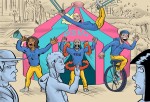You know it’s a problem when your elected officials are scrounging for ways to make themselves relevant.
Especially when it involves creating anonymous forums.
An anonymous forum, it turns out, might just become the calling card for UCLA’s undergraduate student government.
The Campus Events Commission is reviving Spotted on Bruin Walk, an online platform developed in 2010 that allowed students to post anonymously about missed connections. The platform has been dead for four years, but it’s not like students are missing out on much, save for a near endless display of misogyny, hookup attempts and spelling mistakes.
And that’s me putting it nicely.
Alley Madison, the Undergraduate Students Association Council’s campus events commissioner, said her office is resuscitating the platform to allow students to post their observations about their peers, or interesting things they see at CEC events or on campus. She added the aim is to connect with students after the commission’s programs and solicit more organic feedback. The forum is slated to launch in early February, ahead of a Valentine’s Day concert.
The truth is, students don’t need another Spotted on Bruin Walk. But they’re getting one whether they like it or not.
Say hello to perhaps the most worrisome development in Kerckhoff Hall: USAC fabricating more work for itself.
Council members for years have sought out ways to make an increasingly disinterested student body care about their student government. Be it concocting more events to entice students or posting a flurry of exclamation mark-laden Facebook messages, student leaders who aren’t busy advocating for campus needs have found themselves taking up nice-to-have projects that are redundant or unnecessary for the campus community. Council members have tried everything from building mobile apps to solve nonexistent problems, to using campus spaces to host dinners that students care little for to assert their utility at UCLA.
For example, Vivy Li, the 2017-2018 USAC internal vice president, heavily invested her time and office’s resources to work with the university to update its UCLA Mobile app. Li vied to have the app include class schedules, a customizable dashboard and dining hall schedules. Her many months of work resulted in UCLA updating the app months after she left office. UCLA Mobile’s usage doesn’t seem to fare much better than before – it still has yet to receive enough iOS App Store ratings to display an average rating from users.
The year before, Ashly Mohankumar, the 2016-2017 USAC academic affairs commissioner, coordinated networking nights to better help students connect with fellow Bruins. Her endeavor involved inviting speakers to talk about empowering women to participate in STEM and organizing dinners involving Q&A and trivia sessions. The turnout for those events were dismal – a predictable result given some student groups already dedicate themselves to the task of networking and women empowerment.
Spotted on Bruin Walk is just the latest in this trend.
Arguably, it’s even worse. The original version of the forum offered a cesspool of disparaging comments about women on campus – hardly a reasonable price to pay for the occasional heartwarming post about a helpful Bruin.
“Saw you on the way back from your fashion show,” one such post reads. “I have a nice big package for you, if you know what I mean.”
Luckily for students, Madison said the submission process for Spotted on Bruin Walk 2.0, while still not finalized, will include a CEC staffer monitoring the platform periodically throughout the day to moderate posts and restrict verbiage that resembles hate speech or identifies someone.
Yet the need for such a platform is far from pressing. The UCLA Secrets Facebook page has taken up the mantle of offering students anonymous yet civil comments and questions from students. Mobile apps such as Tinder and Grindr allow students to connect with others near or on campus. Google Forms are a readily used and accepted method for getting feedback from students. And social media platforms like Twitter and Instagram have taken off as a means for students to express themselves, even anonymously.
Devoting student fees and resources to an all-in-one, mashed potato platform is just another instance of student government cooking up needs the student body doesn’t have. CEC certainly needs feedback about its events, but bundling in a venue for students to post anonymously about each other isn’t necessary. And if recent history has taught us anything, it’s that these nonessential endeavors result in little benefit to the student body.
Of course, it might seem student leaders are free to do what they want with discretionary fees appropriated to their respective offices – especially considering a majority of USAC’s staffers work for no pay. But students pay more than $200 in student fees for their council members’ time – time their elected representatives should spend advocating for their needs, organizing quality events and representing their interests with the administration.
Efforts like Spotted on Bruin Walk might be entertaining for the student body. But at a time when student groups are struggling for funding, students are shackled by university fees and aid money is drying out, USAC should be offering up solutions to salient problems, not seeking out ways to meme-ify itself.
Council members shouldn’t need an extraneous technology project to figure that out.
At the very least, they don’t need an anonymous platform to tell me they disagree the next time I’m spotted on Bruin Walk.
